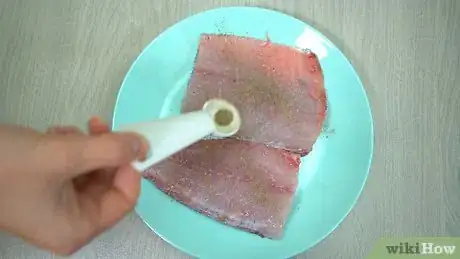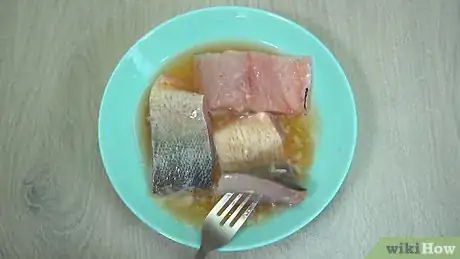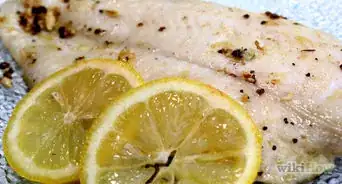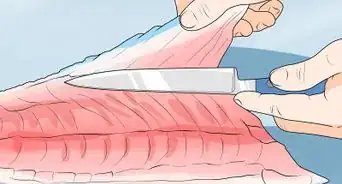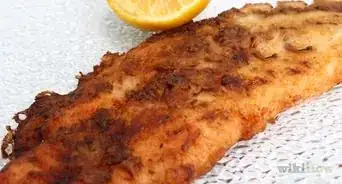This article was co-authored by wikiHow Staff. Our trained team of editors and researchers validate articles for accuracy and comprehensiveness. wikiHow's Content Management Team carefully monitors the work from our editorial staff to ensure that each article is backed by trusted research and meets our high quality standards.
There are 7 references cited in this article, which can be found at the bottom of the page.
The wikiHow Culinary Team also followed the article's instructions and verified that they work.
This article has been viewed 32,588 times.
Learn more...
Tender, sweet amberjack fish filets make a delicious meal any day of the week. Whether you like your fish baked or grilled, amberjack is easy to prepare and cook. You can use a simple dry seasoning or a tasty marinade to infuse more flavors into the filets. The trick to getting perfectly flaky filets is to use fresh or defrosted fish and avoid overcooking.
Ingredients
- 6 amberjack filets
- 1½ tablespoon (21.3 g) of unsalted butter
- 1 lemon cut into 6 wedges
- 12 sprigs of thyme
- Salt
- Black pepper
Makes 6 servings
- 4 amberjack filets
- 1⁄2 cup (120 mL) of white wine
- 1 tablespoon (14.4 g) of mayonnaise
- 2 teaspoons (4.8 g) of seafood seasoning (such as Old Bay)
Makes 4 servings
- 4 amberjack steaks
- 1⁄3 cup (79 mL) of lemon juice
- 1⁄3 cup (79 mL) of red wine vinegar
- 1 tablespoon (12.6 g) of sugar
- 1 teaspoon (.8 g) of fresh thyme
- ½ teaspoon (2.85 g) of salt
- 3 cloves of pressed garlic
- Cracked black pepper
- Salt to taste
Makes 4 servings
- 1 pound (0.45 kg) amberjack filet
- 1 tablespoon (6.9 g) of paprika
- 2 teaspoons (4.66 g) of onion powder
- 2 teaspoons (6.56) of garlic powder
- 1 teaspoon (1.82 g) of dried thyme
- 1 teaspoon (2.02 g) of dried oregano
- 1 teaspoon (2.33 g) of black pepper
- ½ teaspoon (.9 g) of ground red pepper
- Cooking spray
Makes 4 servings
Steps
Lemon Butter Amberjack
-
1Season the filets with salt and pepper. If the filets are damp or wet, pat them dry with a paper towel. Sprinkle some salt and pepper on both sides of the filets so they’re evenly coated.[1]
- If you’re using frozen amberjack, place the filets in a sealed plastic bag and place the bag in a pot of lukewarm water for about 20 minutes or until they’re fully defrosted.
-
2Melt the butter in a pan on medium-high heat. Place a large non-stick pan on your stovetop and set the heat to medium-high. Add 1½ tablespoons (21.3 g) of unsalted butter into the pan and let it melt so it coats the bottom.[2]
- Move the butter around in the pan to help it coat the bottom evenly.
Advertisement -
3Add the filets into the pan. Pick up the filets and gently lay them in the buttered pan. If the filets have skin on them, place them skin-side down first so it gets nice and crispy.[3]
-
4Squeeze a lemon wedge over each filet and add 6 sprigs of thyme. Cut 1 whole lemon into 6 equal wedges and squeeze 1 wedge out over each of the filets so they’re covered in the fresh lemon juice. Take half of your sprigs of thyme and add them to the pan so they mix in with the butter.[4]
-
5Cook the filets for 3-4 minutes on each side and remove them. Allow the filets to cook for 3-4 minutes, then use a spatula and flip them so the other side can cook for the same amount of time. When the filets are white and flaky, they’re finished cooking. Transfer the cooked filets to a plate so you can garnish them.[5]
-
6Sprinkle some salt to taste and garnish the filets with the remaining thyme. Add a pinch of salt over each filet as a final seasoning garnish. Lay the remaining thyme over the filets so each one has a sprig. Then, serve them up while they’re hot![6]
- Serve the buttery fish with a nice fresh veggie like green beans or steamed broccoli.
Baked Amberjack
-
1Preheat your oven to 350 °F (177 °C) and add the wine to a baking dish. Set your oven to preheat so it’s primed and ready to go. Use a baking dish that fits all of your filets and pour 1⁄2 cup (120 mL) of white wine into it.[7]
- Most ovens will beep or indicate when they’re fully preheated.
-
2Arrange the filets on top of the wine and coat them with mayonnaise. Take your amberjack filets and place them in the baking dish so they’re soaking in the white wine. Spread a very thin layer of mayo over the mayo over the top of the filets.[8]
- Make sure the filets are evenly coated in the mayo.
- Use fresh or defrosted filets. If the amberjack is frozen, place the filets in a sealed plastic bag and defrost them in a pot of lukewarm water for 20-30 minutes.
-
3Season the mayo and bake the filets for 20-30 minutes. Take 2 teaspoons (4.8 g) of seafood seasoning and sprinkle it over the mayo on top of the amberjack filets. Slide the baking dish into your oven and let it cook until it turns white, which takes about 20-30 minutes.[9]
- They mayo helps the seasoning stick to the filets and adds a nice flavor and texture to the fish.
- Use a classic seafood seasoning blend like Old Bay.
-
4Remove the filets and check to see if they’re flaky. Use an oven mitt or potholder to safely take the baking dish out of the oven. Use a fork to check the filets to see if they’re white and flaky. If they’re finished cooking, serve them up and enjoy![10]
Grilled Amberjack
-
1Mix lemon juice, vinegar, sugar, thyme, salt, and garlic. In a bowl or a sealable plastic bag, make a marinade by combining 1⁄3 cup (79 mL) of lemon juice, 1⁄3 cup (79 mL) of red wine vinegar, 1 tablespoon (12.6 g) of sugar, 1 teaspoon (.8 g) of fresh thyme, ½ teaspoon (2.85 g) of salt, and 3 cloves of pressed garlic. Mix the ingredients together well to fully combine them.[12]
-
2Add the amberjack steaks and let them marinate for 30 minutes. Place the amberjack in the bowl or bag of marinade and let them sit and soak in the delicious juices. Every 5 minutes or so, turn the amberjack so they soak up the marinade evenly.[13]
- If you’re marinating in a bag, make sure the bag is sealed!
-
3Heat your grill to between 300–350 °F (149–177 °C). While the amberjack is marinating, prepare your grill for medium heat. Allow the temperature to reach between 300–350 °F (149–177 °C), which will sear the amberjack, but won’t burn or overcook it.[14]
- Use the thermometer on your grill to check the temperature.
-
4Remove the amberjack and season them with salt and pepper. After the amberjack marinates for half an hour, take the steaks out and get them ready for the grill. Season them liberally with salt and pepper on both sides.[15]
-
5Grill the amberjack for 4 minutes on each side. Gently place the amberjack on your grill rack and allow them to cook for a full 4 minutes so they get a nice char. Then, flip the steaks and let the other side cook for the same amount of time. Remove the amberjack from the grill and they’re ready to be served.[16]
- Since you’ve already got the grill fired up, add some freshly grilled corn to your meal. Coat the corn ears with cooking spray and grill them for 6 minutes, turning them occasionally so they cook evenly.[17]
Blackened Amberjack
-
1Cut the filet into 4 equal sections. Place the 1 pound (0.45 kg) amberjack filet on a flat surface like a cutting board. Use a sharp knife to cut the filet into 4 equal sizes and set them aside.[18]
- Use fresh amberjack for the best flavor.
- If you’re using frozen amberjack, make sure it’s fully defrosted before you use it.
-
2Combine all of the seasonings in a small bowl. Take a small bowl and add 1 tablespoon (6.9 g) of paprika, 2 teaspoons (4.66 g) of onion powder, 2 teaspoons (6.56) of garlic powder, 1 teaspoon (1.82 g) of dried thyme, 1 teaspoon (2.02 g) of dried oregano, 1 teaspoon (2.33 g) of black pepper, and ½ teaspoon (.9 g) of ground red pepper. Stir the mixture well to create a smooth seasoning blend.[19]
-
3Dredge the fish in the spices and let it stand for 5 minutes. Take the sections of amberjack and dip them into the seasoning blend. Dredge them well so they’re evenly coated with the seasoning. Set the filets aside and allow them to stand for 5 minutes.[20]
- Roll the amberjack around in the seasoning blend so all of the sides are coated as well.
- Use the 5 minutes of resting time to heat up your skillet so it’s ready to go.
-
4Coat a cast-iron skillet in cooking spray and heat over high heat. Take a large cast-iron skillet and coat the bottom of it well with cooking spray. Place it on your stove and heat it over high heat until it’s very hot.[21]
- The key to blackened fish is to make sure the skillet is super hot.
-
5Add the amberjack and cook for 3 minutes on each side. Lay the amberjack filets into the hot pan. Leave them undisturbed for 3 minutes so they get a nice char. Then, use a spatula to flip them and let the other side cook. Remove the filets and serve them up while they’re hot.[22]
- The fish should look charred on both sides. After all, it is called “blackened” amberjack!
- Serve the blackened amberjack on a bed of local greens for a fresh crunch.[23]
-
6Finished.
Warnings
- Make sure the amberjack is fully cooked before you eat it to avoid potential food poisoning. Check to see if the fish is white and flaky to make sure it’s cooked through.⧼thumbs_response⧽
References
- ↑ https://eatsimplefood.com/lemon-butter-amberjack-fish/
- ↑ https://eatsimplefood.com/lemon-butter-amberjack-fish/
- ↑ https://eatsimplefood.com/lemon-butter-amberjack-fish/
- ↑ https://eatsimplefood.com/lemon-butter-amberjack-fish/
- ↑ https://eatsimplefood.com/lemon-butter-amberjack-fish/
- ↑ https://eatsimplefood.com/lemon-butter-amberjack-fish/
- ↑ https://www.allrecipes.com/recipe/255000/baked-amberjack/
- ↑ https://www.allrecipes.com/recipe/255000/baked-amberjack/
- ↑ https://www.allrecipes.com/recipe/255000/baked-amberjack/
- ↑ https://www.allrecipes.com/recipe/255000/baked-amberjack/
- ↑ https://www.thekitchn.com/side-dishes-for-fish-22926179
- ↑ https://cookingbride.com/main-courses/grilled-amberjack/
- ↑ https://cookingbride.com/main-courses/grilled-amberjack/
- ↑ https://cookingbride.com/main-courses/grilled-amberjack/
- ↑ https://cookingbride.com/main-courses/grilled-amberjack/
- ↑ https://cookingbride.com/main-courses/grilled-amberjack/
- ↑ https://www.cookinglight.com/recipes/fish-fire-roasted-summer-veggies
- ↑ https://www.myrecipes.com/recipe/blackened-amberjack
- ↑ https://www.myrecipes.com/recipe/blackened-amberjack
- ↑ https://www.myrecipes.com/recipe/blackened-amberjack
- ↑ https://www.myrecipes.com/recipe/blackened-amberjack
- ↑ https://www.myrecipes.com/recipe/blackened-amberjack
- ↑ https://louisiana.kitchenandculture.com/recipes/pan-seared-amberjack-local-mixed-greens-and-warm-crawfish-vinaigrette
